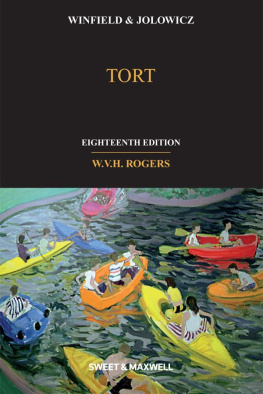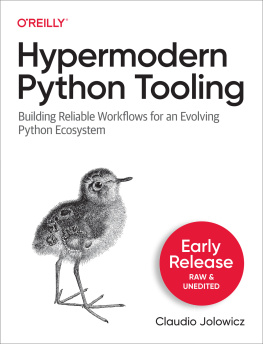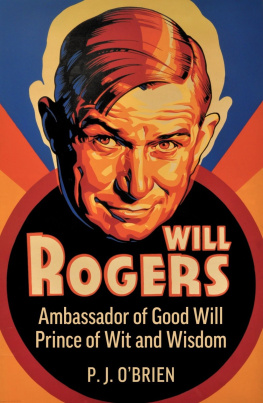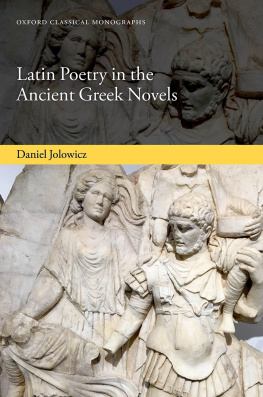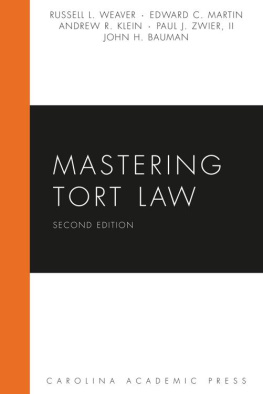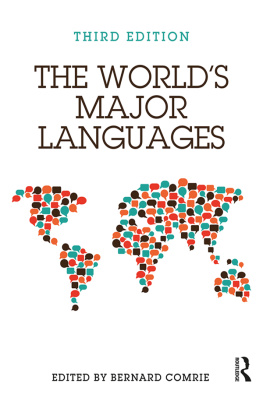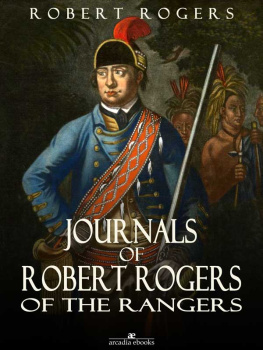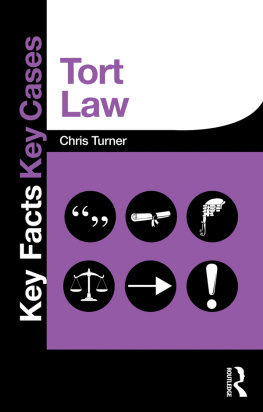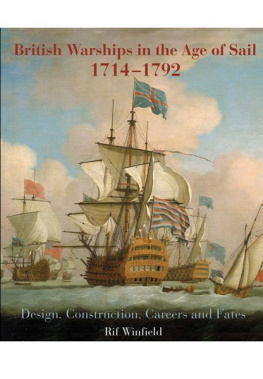WVH Rogers - Winfield & Jolowicz on Tort, 18e
Here you can read online WVH Rogers - Winfield & Jolowicz on Tort, 18e full text of the book (entire story) in english for free. Download pdf and epub, get meaning, cover and reviews about this ebook. year: 2010, publisher: Thomson Reuters, genre: Art. Description of the work, (preface) as well as reviews are available. Best literature library LitArk.com created for fans of good reading and offers a wide selection of genres:
Romance novel
Science fiction
Adventure
Detective
Science
History
Home and family
Prose
Art
Politics
Computer
Non-fiction
Religion
Business
Children
Humor
Choose a favorite category and find really read worthwhile books. Enjoy immersion in the world of imagination, feel the emotions of the characters or learn something new for yourself, make an fascinating discovery.
- Book:Winfield & Jolowicz on Tort, 18e
- Author:
- Publisher:Thomson Reuters
- Genre:
- Year:2010
- Rating:5 / 5
- Favourites:Add to favourites
- Your mark:
- 100
- 1
- 2
- 3
- 4
- 5
Winfield & Jolowicz on Tort, 18e: summary, description and annotation
We offer to read an annotation, description, summary or preface (depends on what the author of the book "Winfield & Jolowicz on Tort, 18e" wrote himself). If you haven't found the necessary information about the book — write in the comments, we will try to find it.
Winfield & Jolowicz on Tort, 18e — read online for free the complete book (whole text) full work
Below is the text of the book, divided by pages. System saving the place of the last page read, allows you to conveniently read the book "Winfield & Jolowicz on Tort, 18e" online for free, without having to search again every time where you left off. Put a bookmark, and you can go to the page where you finished reading at any time.
Font size:
Interval:
Bookmark:
WINFIELD AND JOLOWICZ ON TORT
WINFIELD AND JOLOWICZ ON TORT
EIGHTEENTH EDITION, 2010
BY
W. V. H. ROGERS, M.A.
of Gray's Inn, Barrister;
Senior Fellow in the University of Nottingham

| First Edition | (1937) The Author |
| Second Edition | (1943) The Author |
| Third Edition | (1946) The Author |
| Fourth Edition | (1948) The Author |
| Fifth Edition | (1950) The Author |
| Sixth Edition | (1954) T. Ellis Lewis |
| Seventh Edition | (1963) J. A. Jolowicz and T. Ellis Lewis |
| Eighth Edition | (1967) J. A. Jolowicz with T. Ellis Lewis |
| Ninth Edition | (1971) J. A. Jolowicz with T. Ellis Lewis and D. M. Harris |
| Tenth Edition | (1975) W. V. H. Rogers |
| Eleventh Edition | (1979) W. V. H. Rogers |
| Twelfth Edition | (1984) W. V. H. Rogers |
| Reprinted | (1986) |
| Thirteenth Edition | (1989) W. V. H. Rogers |
| Fourteenth Edition | (1994) W. V. H. Rogers |
| Fifteenth Edition | (1998) W. V. H. Rogers |
| Reprinted | (1999) |
| Reprinted | (2000) |
| Sixteenth Edition | (2002) W. V. H. Rogers |
| Reprinted | (2004) |
| Seventeenth Edition | (2006) W. V. H. Rogers |
| Eighteenth Edition | (2010) W. V. H. Rogers |
Published in 2010 by Thomson Reuters (Legal) Limited
(Registered in England & Wales Company No 1679046,
Registered Office and address for service:
100 Avenue Road, London, NW3 3PF) trading as
Sweet & Maxwell.
For further information on our products and services visit:
www.sweetandmaxwell.co.uk
Typeset by Interactive Sciences Ltd, Gloucester
Printed in the UK by
William Clowes CPI, Beccles, NR34 7TL
A CIP catalogue record
for this book is available
from the British Library
No natural forests were destroyed to make this product,
only farmed timber was used and re-planted.
ISBN 9781847037930
e-ISBN 9780414046245
Thomson Reuters and the Thomson Reuters Logo are trademarks of Thomson Reuters.
Sweet & Maxwell is a registered trademark of Thomson Reuters (Legal) Limited.
Crown Copyright material is reproduced with the permission
of the Controller of HMSO and the Queen's Printer for Scotland.
All rights reserved. No part of this publication may be reproduced or transmitted,
in any form or by any means, or stored in any retrieval system of any nature,
without prior written permission, except for permitted fair dealing under the
Copyright, Designs and Patents Act 1988, or in accordance with the terms
of a licence issued by the Copyright Licensing Agency in respect of
photocopying and/or reprographic reproduction. Application for
permission for other use of copyright material including permission to
reproduce extracts in other published works shall be made to the
publishers. Full acknowledgement of author, publisher and
source must be given.
Thomson Reuters (Legal) Limited 2010
PREFACE TO THE EIGHTEENTH EDITION
In the last few years I have become accustomed to the House of Lords making some radical changes to tort law at the end of the legal year when this book had already been set up. Last time, for example, six-and-a-half pages of a seven-and-a-half-page Preface had to be devoted to this phenomenon. Those late developments, like Barker v Corus and Customs and Excise v Barclays Bank , have been woven into this edition. This time, the schedule requires submission of the Preface rather earlier. Whether or not the Supreme Court has something up its sleeve this Term, there are upcoming appeals in Sienkiewicz v Greif (UK) Ltd (proof of causation, Ch.6), Morrison Sports v Scottish Power (breach of statutory duty, Ch.7) and Bocardo v Star Energy (damages for subterranean trespass, Ch.13). On the legislative front there is not a great deal of lawyer's law in the last four years. It is now nine years since the Law Commission proposed a cleansing of the Augean stables of limitation of actions but that did not appear even in the draft Civil Law Reform Bill of 2009, though it had been promised. For that nine years of inaction, the legislation on crime, criminal justice, policing and terrorism covers at least 3,347 pages of the statute book.
This is a book about tort doctrine, the substantive law; but tort law in operation is the focus of the current crisis (not too strong a word) over costs and the financing of litigation, It may be that the most significant event since the last edition is the appearance of Jackson L.J.'s Review of Civil Litigation Costs . This monumental report (produced with astonishing speed) appeared not long before the text had to be submitted, but some of its principal recommendations are outlined in the context of personal injuries in Ch.1. It is proposed that the success fees and after the event insurance (ATE) premiums associated with Conditional Fee Agreements should cease to be recoverable by the successful claimant, since these are the main factors which have driven up costs over the last few years. Nor is it just a matter of defendants liability insurers having to pay more, for there has been litigation on a pretty heroic scale between ATE insurers and claimants solicitors who, the insurers allege, failed properly to vet the strength of claims brought with ATE policies ( Axa Insurance v Akther & Derby , Ch.26).
As far as the basic structure of the law is concerned, the restatement of the economic torts in OBG v Allan (Ch.18) is easily the most important development (though it is ironic that hardly anyone studying Torts nowadays will ever be exposed to this). Revenue & Customs v Total on conspiracy ensures that we have not got a wholly symmetrical system but there is no doubt that we have made progress in simplifying this area. In the last few years, litigation on trade disputes has tended to be about the details of ballots; now we shall have to see how the statutory structure of immunities written in the Thomson v Deakin Rookes v Barnard era will operate after OBG v Allan .
The Duty of Care War (now 40 years old if we treat Home Office v Dorset Yacht Co as the first engagement) seems to have been a little quieter than in the period covered by the last edition, but the relationship between tort law and public law continues to give trouble. If the defendants application for permission to appeal in Connor v Surrey C.C . (Ch.5) is successful, the Supreme Court will have another opportunity to look at the issue. The Law Commission has produced provisional proposals in this area, which are outlined in Ch.5, but they do not seem to have been generally very well received.
Defamation continues to give trouble, despite the clarification of the Reynolds principle in Jameel v Wall Street Journal (Ch.12). After submission of the text, the CA in British Chiropractic Association v Singh (briefly mentioned in Ch.12 at proof stage) held that a statement that the defendants happily promoted bogus treatments was capable of being read as meaning, promoted treatments for which the defendant believed there was no scientific support and hence fell within the scope of fair comment. In that sense the case turns on its particular facts, for one cannot lay down rules about the difference between facts and opinions (or value judgments as the European Court of Human Rights likes to call them). But that conceals a deeper problem. The claimants had not taken on the newspaper in which the statement appeared but only the author and, as Lord Judge C.J. put it at [12], the, unhappy impression [had] been created that this [was] an attempt by the BCA to silence one of its critics, the issue of the efficacy of chiropractic being a matter of very legitimate interest to patients. The claim has now been abandoned and the BCA will be liable for large costs; but the defendant will have suffered the stress of nearly two years of litigation and will no doubt be out of pocket. There is to be another review of defamation law and readers may care to look at Lord Lester's Defamation Bill (May 26, 2010), the purpose of which is probably to inform the review. No doubt defamation law is imperfect, but like much else in the law the real problem is less the substantive rules than the way in which quite small issues can quickly rack up alarming costs expenditure for both sides. A particular area of controversy has been libel tourism. Americans are not diffident about promoting the merits of their own institutions and rarely pay much regard to what happens outside their shores in this respect, seeming to believe, as Lord Hoffmann said in his 2010 Ebsworth Memorial Lecture, the whole world should share their view about how to strike the balance between freedom of expression and the defence of reputation. It is not surprising that he got a good deal of abuse for his views but what is disheartening (though not surprising) is that nowhere in the serious newspaper comment on this issue would you have discovered that the supposedly antiquated law here on the reporting of matters of public concern is of quite recent growth and is more or less the same everywhere except the United States: Australia, New Zealand, Canada (at the end of 2009) and Ireland (by statute in 2009). But slogans are easier than facts.
Font size:
Interval:
Bookmark:
Similar books «Winfield & Jolowicz on Tort, 18e»
Look at similar books to Winfield & Jolowicz on Tort, 18e. We have selected literature similar in name and meaning in the hope of providing readers with more options to find new, interesting, not yet read works.
Discussion, reviews of the book Winfield & Jolowicz on Tort, 18e and just readers' own opinions. Leave your comments, write what you think about the work, its meaning or the main characters. Specify what exactly you liked and what you didn't like, and why you think so.

